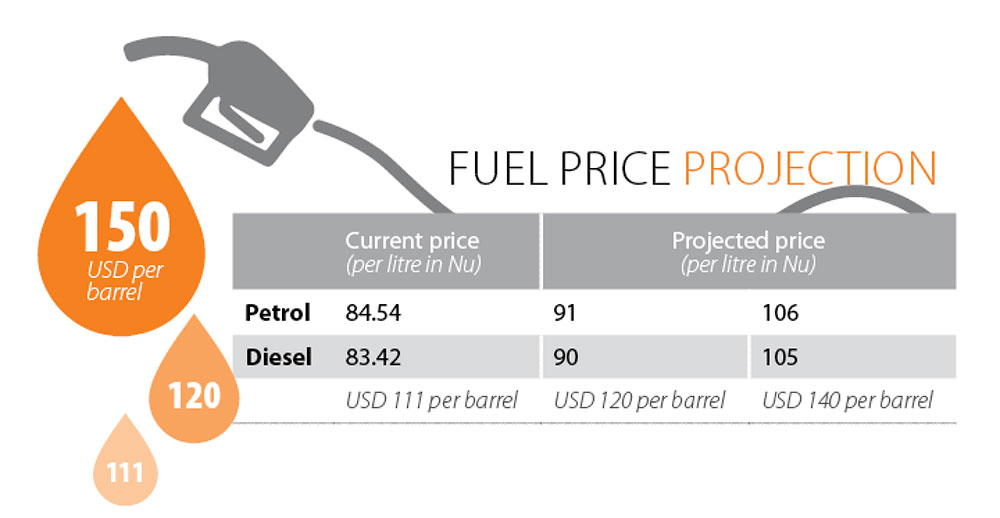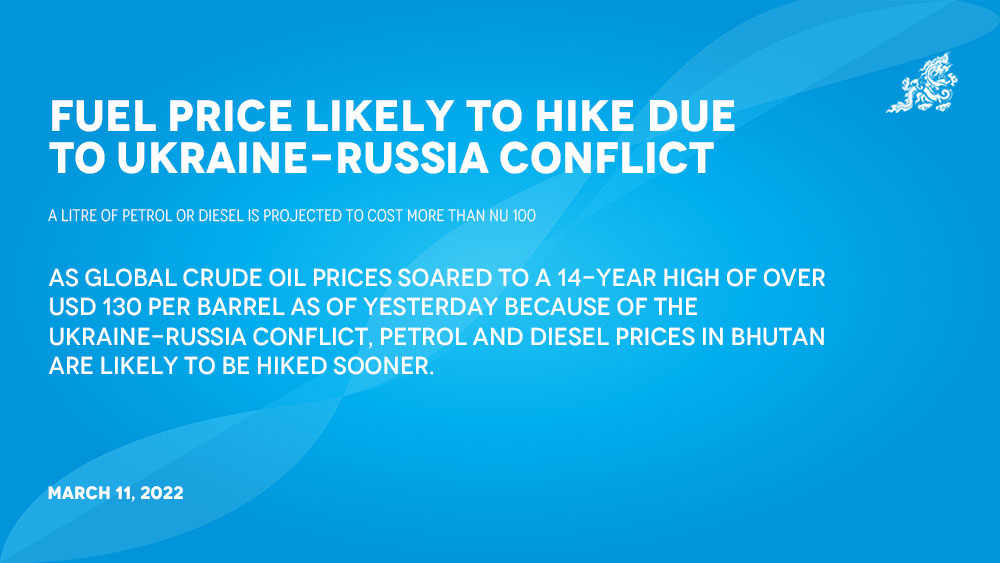A litre of petrol or diesel is projected to cost more than Nu 100
Thukten Zangpo
As global crude oil prices soared to a 14-year high of over USD 130 per barrel as of yesterday because of the Ukraine-Russia conflict, petrol and diesel prices in Bhutan are likely to be hiked sooner.
Today, a litre of petrol cost Nu 84.54 and Nu 83.42 for diesel in Thimphu. Fuel price revision invoice shared on March 1 stated that prices were determined when India purchased crude oil at USD 111 per barrel.
However, international oil prices have been on the boil since the Ukraine-Russian conflict on February 24. Oil prices spiked after fears that oil supplies from Russia that account for 10 percent of global crude oil production would be disrupted by western sanctions.
Minister of economic affairs, Loknath Sharma, said the global crude oil price and exchange rate of the Indian rupee would impact fuel prices in Bhutan. India imports 85 percent of its oil needs and Bhutan imports fuel from India.
“Given the same pricing components, if the global crude oil price strikes to USD 120 per barrel, an expected price of fuel in Thimphu would be approximately Nu 91 a litre for petrol and Nu 90 a litre for diesel,” Lyonpo said.

Similarly, he added that if oil price hits USD 140 a barrel, the expected price for fuel in Thimphu will be about Nu 106 a litre for petrol and Nu 105 a litre for diesel.
“The experts have warned that the crude oil price is set to surpass its record high of USD 150 a barrel,” Lyonpo said.
The new fuel price will come into effect on the first and 16th of every month as per the memorandum of understanding between Bhutan and India.
Currently, fuel price is taxed 10 percent, of which five percent is green tax and five percent sales tax in Bhutan.
State Trading Corporation of Bhutan Limited’s general manager, Sugan Pradhan said that Hindustan Petroleum Corporation Limited informed them that fuel prices could go up this month. “But they assured supply would not be an issue.”
According to the department of trade, Bhutan’s average estimated daily consumption of petrol is 137 kilolitre (KL) and diesel is 410 KL.
Meanwhile, the economic affairs minister said that fuel price hike might cause inflation, deteriorate current account deficit, and ngultrum exchange rate. “But it would be for short-term.”
The hike in fuel price would increase the price of goods since it constitutes 25 percent of the consumer price index.
The Royal Monetary Authority’s (RMA) study on the impact of fuel price on inflation in 2021 found that an increase in fuel prices by 10 percent would increase monthly inflation by 3.6 percent within a month and further push inflation by 1.3 percent after three months.
“If fuel prices increase by 10 percent, other factors remaining constant, the total increase in inflation will be 4.9 percent after three months from now,” it added.
The price of consumer goods and services in January this year went up by 6.03 per cent from January last year.
While Covid-19 protocols alone increased transportation costs to 7.2 percent and higher, Lyonpo Loknath Sharma said.
Lyonpo added that wholesalers are advised to stock goods a little above normal in case prices increase in India. “There are global efforts to stabilise prices and India is trying on its own as well which will ease our situation as well.”
He also said that the hike in fuel prices will also affect the competitiveness of manufacturing industries as it impacts the supply chain and logistics cost of raw materials during imports and during the export of finished goods or materials.
“If global prices persistently remain high, India may increase the use of coal for power generation and this will further accentuate the coal import difficulties for our industries,” he said.
According to the RMA, Bhutan’s current account deficit was recorded at Nu 21.78 billion (B) or 12.7 percent of gross domestic product (GDP) in fiscal year 2020-2021 which saw an improvement from 15.5 percent of GDP (Nu 27.71B) in 2019-2020.
Bhutan’s trade with conflict countries
Bhutan exported products worth USD 27,039.46 in 2020 to Russia (cordyceps, thangka, and Kuthang) and imported worth USD 16,056.49 from Ukraine (machines). The direct trade volume is negligible, as no import from Russia and no export to Ukraine.


